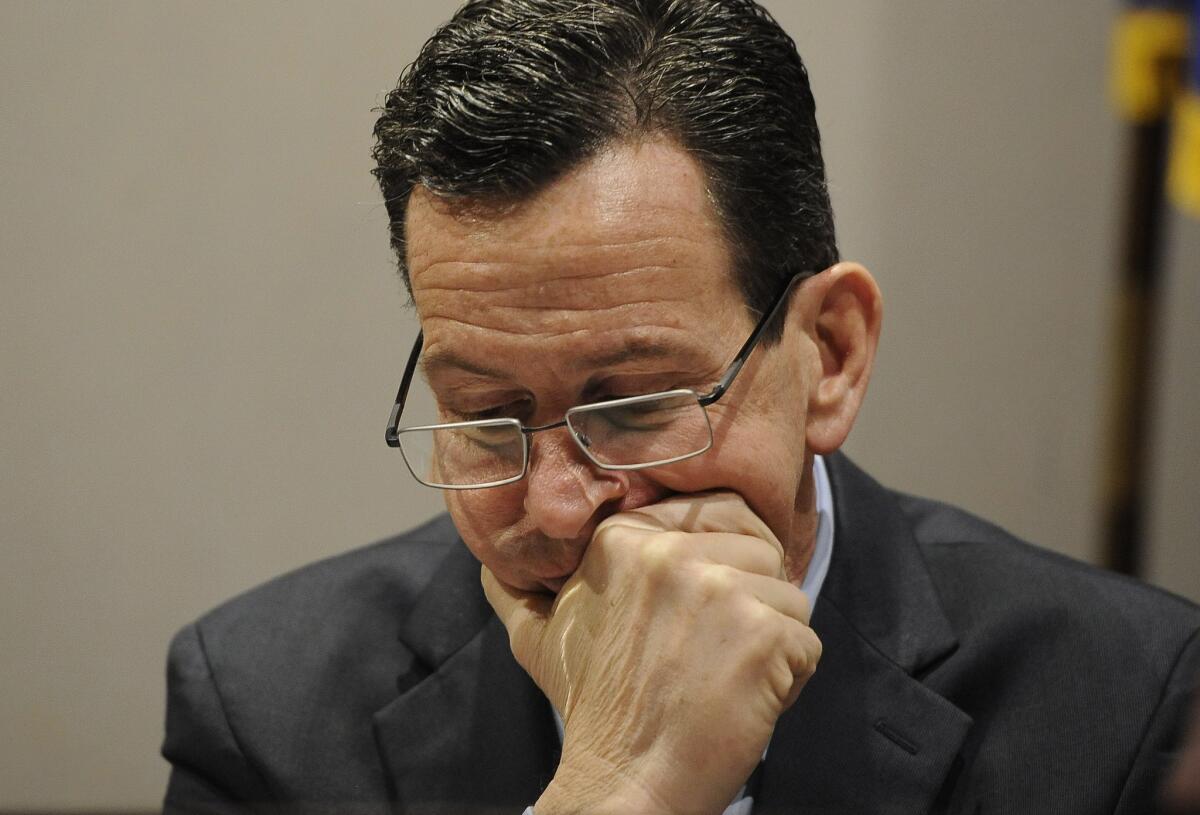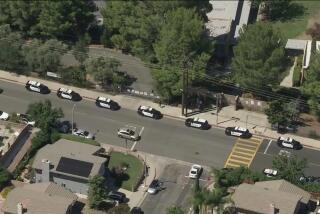Sandy Hook group’s final report calls for change: ‘We must do something’

- Share via
Reporting from New York — Some things have changed since that awful day two years ago when a gunman walked into Sandy Hook Elementary School in Newtown, Conn., and killed 20 first-graders and six employees.
The school, which sat on a two-lane road up from the fire station, has been torn down. Soon, the large house where the shooter and his mother lived will also be razed. The makeshift memorials and shrines that served as constant reminders of tragedy are mostly gone.
But some things have not changed, including the problem of gun violence in schools, members of an advisory commission established after the shootings said Friday as they wrapped up two years of work and presented their final report to Gov. Dannel P. Malloy.
The 277-page document contains 52 recommendations aimed at preventing another school massacre. Some are simple: locks on every classroom door, and trigger locks to be sold with each firearm. Others are far more complicated and focus on the problem of mental health services and how to ensure troubled individuals get help before they snap.
The report is the latest in a string of lengthy documents compiled in the aftermath of the shooting. While earlier ones reviewed the police response to the Dec. 14, 2012, massacre, and detailed lapses in mental health care that led shooter Adam Lanza to go on his rampage, this report focuses on changes that could prevent another Adam Lanza.
“We must do something different. We must do something better,” said Scott D. Jackson, who served as chairman of the 16-member Sandy Hook Advisory Commission, which included mental health experts, first responders, educators and political leaders.
------------
FOR THE RECORD
A previous version of this post said the Sandy Hook Advisory Commission had 15 members. It had 16 members.
------------
Jackson, who is mayor of the Connecticut town of Hamden, said there had been more than 100 school shootings in the United States since the one at Sandy Hook.
“While the circumstances are different in each one of them, the facts are clear. Our schools should be sanctified places, and they are not,” Jackson said, calling the report a “moral statement” that should guide schools nationwide in how to keep students safe.
Few shootings have been as deadly as the one in Newtown. Lanza, 20, killed the first-graders and school workers before committing suicide in the school hallway. Earlier, he had shot to death his mother, Nancy Lanza.
Malloy, a Democrat, acknowledged that budget constraints would make it difficult to implement many of the suggested changes, but he described others, such as the recommendation that trigger locks be sold with all firearms, as “common sense.”
If the Sandy Hook shootings proved anything, though, it was how difficult it is to change gun laws in the face of fierce opposition from gun-rights advocates. They are wary of most attempts to change firearms laws and see restrictions as an infringement on their constitutional right to bear arms.
After the shootings, President Obama came to Newtown and vowed to press for tougher national gun legislation. His effort to widen background checks for gun buyers and limit sales of high-capacity magazines failed.
Among the Sandy Hook commission recommendations likely to face opposition: allowing ammunition purchases only for registered firearms; requiring people to renew their firearm permits at regular intervals; limiting the amount of ammunition that could be purchased at any given time; and requiring gun clubs to report “negligent or reckless behavior” with a firearm to state officials.
The commission compiled its report after taking testimony from more than 100 people since its first meeting in January 2013. Witnesses included parents of some of the Sandy Hook victims, many of whom became active in the battle for tougher gun laws.
Wayne Sandford, a commission member and the former deputy commissioner of the Connecticut Department of Emergency Management and Homeland Security, said the challenge would be finding money to pay for some of the recommendations, especially those dealing with improving access to mental health programs.
Sandford, though, said the state needed to find a way to make some of the changes, to “save the children in the future.”
Noting the shootings that have occurred since Sandy Hook, Sandford said, “It’s only a matter of time, the way we’re going, that there will be another shooting in Connecticut.”
Follow @TinaSusman for national news
More to Read
Sign up for Essential California
The most important California stories and recommendations in your inbox every morning.
You may occasionally receive promotional content from the Los Angeles Times.











